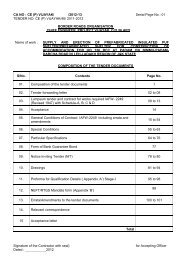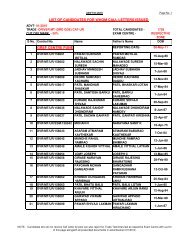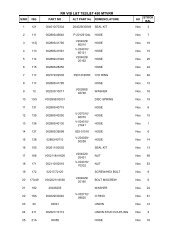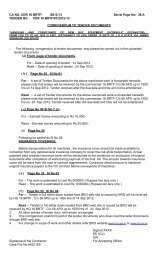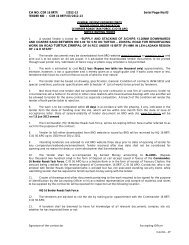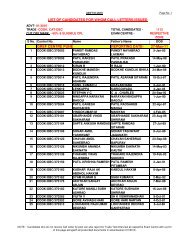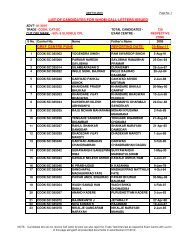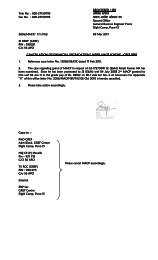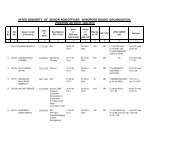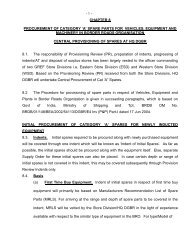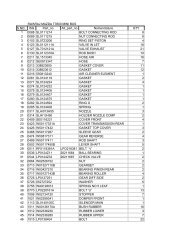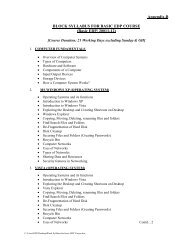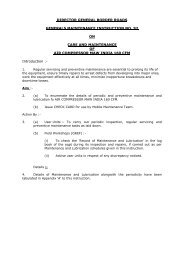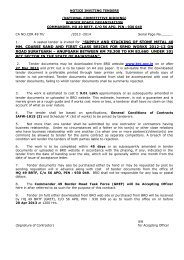- Page 1 and 2:
CHAPTER 1
- Page 3 and 4:
RESTRICTED (n) Watch receipt of bas
- Page 5 and 6:
RESTRICTED 3 Visit by Unit Represen
- Page 7 and 8:
RESTRICTED 5 CHAPTER 2 RESTRICTED
- Page 9 and 10:
Action by Unit on Statements of Acc
- Page 11 and 12:
RESTRICTED (b) At the time of dispa
- Page 13 and 14:
RESTRICTED 10 Procedure to be follo
- Page 15 and 16:
RESTRICTED 12 Miscellaneous Claims
- Page 17 and 18:
RESTRICTED 14 RESTRICTED
- Page 19 and 20:
RESTRICTED (d) All literate pers si
- Page 21 and 22:
RESTRICTED Restricting Payment wher
- Page 23 and 24:
RESTRICTED ALLOTMENT OF GREF NUMBER
- Page 25 and 26:
RESTRICTED CHAPTER 4 RESTRICTED
- Page 27 and 28:
RESTRICTED 21 (b) Battle Casualties
- Page 29 and 30:
RESTRICTED 23 (c) Date of death wit
- Page 31 and 32:
RESTRICTED Procedure for intimation
- Page 33 and 34:
RESTRICTED 27 24. No communication
- Page 35 and 36:
RESTRICTED Reporting of Air Raid Ca
- Page 37 and 38:
RESTRICTED 31 Specimen Condolence l
- Page 39 and 40:
RESTRICTED 33 RESTRICTED
- Page 41 and 42:
RESTRICTED 34 k- bl dk;kZy; esa miy
- Page 43 and 44:
RESTRICTED 36 Court of Inquiry on A
- Page 45 and 46:
RESTRICTED Maintenance of Casualty
- Page 47 and 48:
RESTRICTED CHAPTER 5 RESTRICTED
- Page 49 and 50:
RESTRICTED Nepalese National 6. As
- Page 51 and 52:
RESTRICTED 14. In the case of ex-se
- Page 53 and 54:
RESTRICTED 27. The appointing autho
- Page 55 and 56:
Introduction RESTRICTED COUNTING OF
- Page 57 and 58:
RESTRICTED (c) In order to facilita
- Page 59 and 60:
RESTRICTED FORFEITURE OF SERVICE ON
- Page 61 and 62:
RESTRICTED Introduction DESERTION 1
- Page 63 and 64:
RESTRICTED 52 (c) Date on which kit
- Page 65 and 66:
RESTRICTED Trial of Deserters 10. D
- Page 67 and 68:
RESTRICTED 55 Note :- “ It is not
- Page 69 and 70:
RESTRICTED CHAPTER 8 RESTRICTED
- Page 71 and 72:
RESTRICTED (c) If in any case a dec
- Page 73 and 74:
RESTRICTED MEDICAL CATEGORISATION -
- Page 75 and 76:
RESTRICTED 9. No category will be a
- Page 77 and 78:
RESTRICTED Appendix „B‟ to HQ D
- Page 79 and 80:
RESTRICTED 2. CATEGORY GREF-II An i
- Page 81 and 82:
RESTRICTED CHAPTER 10 RESTRICTED
- Page 83 and 84:
RESTRICTED 5. In case of personnel
- Page 85 and 86:
RESTRICTED Introduction DOCUMENTATI
- Page 87 and 88:
RESTRICTED 4. In addition to above,
- Page 89 and 90:
RESTRICTED (m) Application form of
- Page 91 and 92:
RESTRICTED 5. It is only after the
- Page 93 and 94:
RESTRICTED RECORDING OF EDUCATIONAL
- Page 95 and 96:
RESTRICTED (e) Notwithstanding the
- Page 97 and 98:
RESTRICTED Bogus Educational Certif
- Page 99 and 100:
RESTRICTED 7. In the event of cash
- Page 101 and 102:
RESTRICTED GRANT OF ANNUAL INCREMEN
- Page 103 and 104:
RESTRICTED 8. The benefit of specia
- Page 105 and 106:
RESTRICTED KINDRED ROLL/CHANGE OF N
- Page 107 and 108:
RESTRICTED Introduction PLURAL MARR
- Page 109 and 110:
RESTRICTED 11. In no circumstances
- Page 111 and 112:
Introduction RESTRICTED DESTRUCTION
- Page 113 and 114:
RESTRICTED 5. The following documen
- Page 115 and 116:
RESTRICTED Termination of Lien 11.
- Page 117 and 118:
RESTRICTED ARMY PERSONNEL ON ERE IN
- Page 119 and 120:
RESTRICTED Inter Project Adjustment
- Page 121 and 122:
RESTRICTED PREPARATION OF ELECTORAL
- Page 123 and 124:
RESTRICTED 12. The Record Office wi
- Page 125 and 126:
Introduction RESTRICTED CENTRAL GOV
- Page 127 and 128:
RESTRICTED calculated at the rate o
- Page 129 and 130:
RESTRICTED Withdrawal from Insuranc
- Page 131 and 132:
RESTRICTED Government of India Form
- Page 133 and 134:
RESTRICTED To : *The Form 6 Sir, Su
- Page 135 and 136:
RESTRICTED Form 8 Nomination for be
- Page 137 and 138:
RESTRICTED CHAPTER 14 RESTRICTED
- Page 139 and 140:
RESTRICTED Leave Not Due 9. Leave n
- Page 141 and 142: RESTRICTED 19. Sunday/Holidays fall
- Page 143 and 144: RESTRICTED General HONOURS AND AWAR
- Page 145 and 146: RESTRICTED 3 Vir Chakra 7000/- 5000
- Page 147 and 148: RESTRICTED Sl Award/Name of Decorat
- Page 149 and 150: RESTRICTED 8 Mention in Despatch 20
- Page 151 and 152: RESTRICTED SC 1000000/- - 50000/- S
- Page 153 and 154: RESTRICTED 1 Param Vir Chakra 22500
- Page 155 and 156: RESTRICTED 2 Maha Vir Chakra 15000/
- Page 157 and 158: RESTRICTED 3 Vir Chakra 7000/- (100
- Page 159 and 160: RESTRICTED 11 Mention in Despatch 2
- Page 161 and 162: RESTRICTED 6 Shaurya Chakra 10,00,0
- Page 163 and 164: RESTRICTED Sl Award/Name of Decorat
- Page 165 and 166: RESTRICTED respect of a bar to an a
- Page 167 and 168: RESTRICTED Workshops per year upto
- Page 169 and 170: RESTRICTED (b) Since each case is r
- Page 171 and 172: RESTRICTED 7. On announcement of aw
- Page 173 and 174: RESTRICTED kin of recipients of awa
- Page 175 and 176: RESTRICTED 129 (g) The latest detai
- Page 177 and 178: RESTRICTED Introduction MEDALS/STAR
- Page 179 and 180: RESTRICTED (c) Sainya Seva Medal wi
- Page 181 and 182: RESTRICTED (ii) All ranks of the Ra
- Page 183 and 184: RESTRICTED (o) OP Vijay Star :- The
- Page 185 and 186: RESTRICTED Wearing of 10,20 and 30
- Page 187 and 188: RESTRICTED VERIFICATION OF THE CLAI
- Page 189 and 190: RESTRICTED OFFICE MEMORANDUM Subjec
- Page 191: RESTRICTED DP & AR OM No 36011/16/8
- Page 195 and 196: RESTRICTED “Provided that the upp
- Page 197 and 198: RESTRICTED (a) Where the post is fi
- Page 199 and 200: RESTRICTED 5. Further relaxation of
- Page 201 and 202: RESTRICTED 7. Relaxation of Standar
- Page 203 and 204: RESTRICTED Scheduled Tribes through
- Page 205 and 206: RESTRICTED (iv) Copy of Office Memo
- Page 207 and 208: RESTRICTED APPOINTMENT ON SC/ST CAN
- Page 209 and 210: RESTRICTED 7. On selection of a can
- Page 211 and 212: RESTRICTED (b) Where non-production
- Page 213 and 214: RESTRICTED 14. Apart from the above
- Page 215 and 216: RESTRICTED 21. The vacancies are ad
- Page 217 and 218: RESTRICTED Departmental Promotion 2
- Page 219 and 220: RESTRICTED 32. (a) The names of the
- Page 221 and 222: RESTRICTED Introduction REFUSAL OF
- Page 223 and 224: RESTRICTED (d) Date of successful c
- Page 225 and 226: RESTRICTED 5. While considering a r
- Page 227 and 228: RESTRICTED MEMBERSHIP 3. (a) Eligib
- Page 229 and 230: RESTRICTED 9. Powers of the Governi
- Page 231 and 232: RESTRICTED 19. Claiming Procedure.
- Page 233 and 234: RESTRICTED 28. Powers and Duties of
- Page 235 and 236: RESTRICTED Appendix “A” APPLICA
- Page 237 and 238: RESTRICTED Appendix “C” CASH RE
- Page 239 and 240: RESTRICTED CHAPTER 17 RESTRICTED
- Page 241 and 242: RESTRICTED 5. DOs Part II will be i
- Page 243 and 244:
RESTRICTED PENSIONARY AWARDS Introd
- Page 245 and 246:
RESTRICTED 195 12. The revised prov
- Page 247 and 248:
RESTRICTED 22. A pension granted or
- Page 249 and 250:
RESTRICTED 199 RESTRICTED
- Page 251 and 252:
RESTRICTED GREF DISCHARGE CERTIFICA
- Page 253 and 254:
RESTRICTED MEMORANDUM IN REPLY TO R
- Page 255 and 256:
RESTRICTED CHAPTER 19 RESTRICTED
- Page 257 and 258:
RESTRICTED (h) Choice postings will
- Page 259 and 260:
RESTRICTED (i) Medical category of
- Page 261 and 262:
RESTRICTED Final Selection 7. Perso
- Page 263 and 264:
RESTRICTED (o) Deputation 11. Ideal
- Page 265 and 266:
RESTRICTED 15. Hardness Index (a) T
- Page 267 and 268:
RESTRICTED (m) Compassionate postin
- Page 269 and 270:
RESTRICTED 216 (b) The balance span
- Page 271 and 272:
RESTRICTED (b) Personnel in low med
- Page 273 and 274:
RESTRICTED 40. With a view to give
- Page 275 and 276:
RESTRICTED (d) Female employees who
- Page 277 and 278:
RESTRICTED 55. If the indl is place
- Page 279 and 280:
RESTRICTED 59. Non implementation o
- Page 281 and 282:
RESTRICTED 70. In order to restrict
- Page 283 and 284:
RESTRICTED 81. Once the case on com
- Page 285 and 286:
RESTRICTED Rotation of Technical St
- Page 287 and 288:
RESTRICTED Reliefs 99. All possible
- Page 289 and 290:
RESTRICTED good posting at the cost
- Page 291 and 292:
RESTRICTED MASTER SENIORITY LIST In
- Page 293 and 294:
RESTRICTED CHAPTER 21 RESTRICTED
- Page 295 and 296:
RESTRICTED (VI) In Section 63, for
- Page 297 and 298:
RESTRICTED 241 (b) (c) Result of th
- Page 299 and 300:
RESTRICTED (c) Compulsory retiremen
- Page 301 and 302:
RESTRICTED Section of Army Act - 19
- Page 303 and 304:
RESTRICTED 58 Signing in blank and
- Page 305 and 306:
RESTRICTED CHAPTER 22 RESTRICTED
- Page 307 and 308:
RESTRICTED Column 10: Under posting
- Page 309 and 310:
RESTRICTED Introduction DETAILMENT
- Page 311 and 312:
RESTRICTED Medical 252 10. Student
- Page 313 and 314:
RESTRICTED Pay and Allowance and is
- Page 315 and 316:
RESTRICTED CHAPTER 24 RESTRICTED
- Page 317 and 318:
RESTRICTED 5. Where an individual o
- Page 319 and 320:
RESTRICTED Initiation of ACRs of Pe
- Page 321 and 322:
RESTRICTED 23. All representations,
- Page 323 and 324:
RESTRICTED Silent Feature 30. While
- Page 325 and 326:
RESTRICTED Responsibility of Record
- Page 327 and 328:
RESTRICTED POLICY GUIDE LINES ON DE
- Page 329 and 330:
RESTRICTED (ix) Special condition i
- Page 331 and 332:
RESTRICTED (h) GREF Clothing Cards
- Page 333 and 334:
RESTRICTED UNDERTAKING I, GS/No ___
- Page 335 and 336:
RESTRICTED CONFIRMATION FROM PROJEC
- Page 337 and 338:
RESTRICTED S/No POINT 12. Is the in



